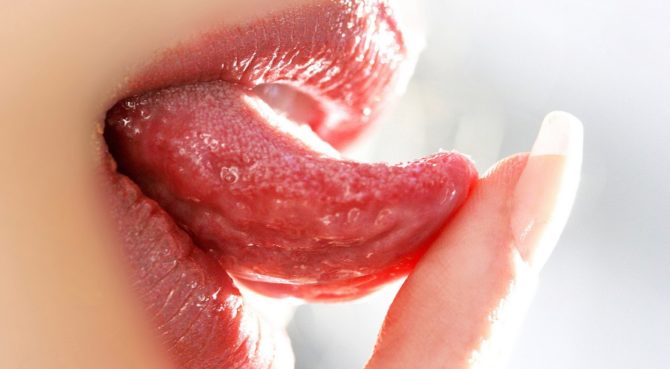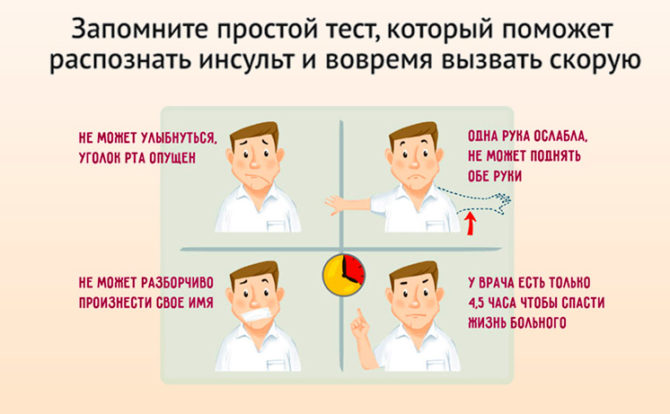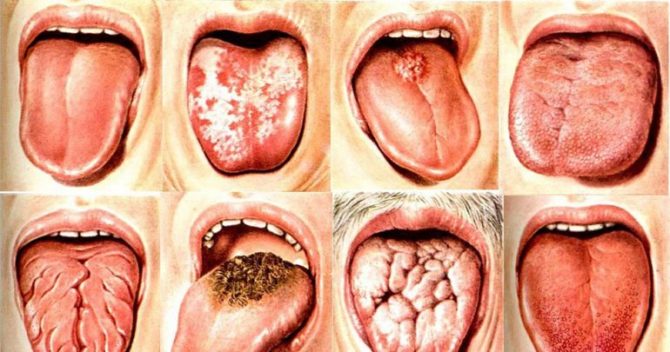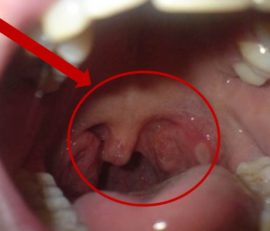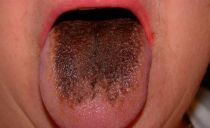The language goes numb: what does it mean, causes, treatment
A condition in which a certain part of the tongue or the entire organ loses its sensitivity is called paresthesia. There are many reasons that explain why the tip, middle or root of the tongue is numb. Among them are both the effects of external factors and serious diseases requiring immediate medical attention.
Content
Why is tongue paresthesia manifested
The main reasons that provoke numbness of the tongue include the negative impact of external factors and diseases, one of the symptoms of which is paresthesia. External factors include: excessive smoking, allergic reactions to foods and medicines, injuries, injuries, burns, intoxication.
The tongue goes numb with the following diseases:
- A decrease in the sensitivity of the tongue may mean that a person has malignant tumors in the larynx, in the brain. This condition with neoplasms is not the main symptom, paresthesia accompanies severe headaches (in case of brain cancer), nausea, low temperature and pressure. Oncological diseases of the larynx, in addition to numbness, are manifested by sore throat (as with SARS), impaired palate sensitivity, discomfort and difficulty swallowing.
- The tongue may become numb due to a beginning stroke or heart attack. In this condition, paresthesia of the hands, tongue and lips is one of the main symptoms. Among the additional ones, acute headache, dizziness, nausea and vomiting are distinguished.
- Osteochondrosis of the cervical spine can cause impaired mobility, damage and numbness of the nerve endings of the tongue. With osteochondrosis, the head may hurt and become dizzy.
- Violation of the psycho-emotional background. Severe stresses, deep depressive states can provoke severe headaches, impaired sensitivity of the face, lips, and mucous membranes of the oral cavity. Disorders of a psycho-emotional nature are the cause of migraine with an aura - a disease in which the head hurts greatly and the functioning of the senses is disturbed.
- If the tip of the tongue is numb and sore, there is a burning sensation, tingling sensation, which means that a person has started glossalgia or glossitis.
- Diabetes mellitus resulting from a violation of insulin production leads to a feeling of thirst, dryness in the oral cavity, partial loss of sensitivity of the tongue.
- Anemia can cause a decrease in the sensitivity of the mucous membranes of the oral cavity, numbness of the extremities, low temperature, pallor of the skin, impaired coordination.
- Age-related changes. A woman during menopause has hormonal disruptions that can provoke numbness of the tongue.
- Oral candidiasis is a disease that is accompanied by soreness, mucosal plaque formation, itching, swelling, and partial numbness of the tongue.
- Impaired facial nerves (Bell palsy). Pathology is expressed in partial paresthesia.
Paresthesia can be caused by transformations that occur in the body of a pregnant woman.
Determining the cause of numbness of the tongue by the localization of the symptom
The tongue may lose sensitivity partially or completely.It is necessary to pay attention to what part of the organ is numb, since localization can indicate a specific disease.
Paresthesia begins with a tingling of the tip of the tongue, then “running goosebumps” appear on the entire surface of the organ, and after that there is a sensation of partial or complete numbness of the tongue.
In most cases, numbness of the tip of the tongue is a sign of the negative impact of external factors. This condition manifests itself with excessive smoking, alcohol consumption, intoxication, an imbalance of vitamins and minerals in the body, especially with a lack of vitamin B12. An allergic reaction can cause a loss of sensitivity of the tip of the tongue, in which case the symptom will be accompanied by swelling and paresthesia of the oral mucosa.
Numbness of the tongue and hands, accompanied by an acute headache, requires immediate consultation by a neurologist. Paresthesia in tandem with migraine can signal a sharp drop in insulin and an increase in blood sugar. In this case, consultation with the endocrinologist is necessary.
Paresthesia of the throat and tongue indicates the occurrence of malignant neoplasms in the larynx. Numbness of the tongue and palate can be a manifestation of an allergic reaction. Injuries or damage to the glossopharyngeal nerve lead to a numb root of the tongue.
A condition in which the tongue is numb and dizzy can be a symptom of VVD (vegetative-vascular dystonia), osteochondrosis, neurological disorders and disorders, pre-infarction or pre-stroke condition.
Professional treatment for numbness of the tongue
Loss of sensitivity of the tongue is not an independent disease, but a symptom that accompanies the underlying pathology. Only by identifying the reason due to which the tongue goes numb, the specialist will prescribe treatment that will be aimed at eliminating the underlying disease or irritating factor.
In cases where paresthesia is caused by osteochondrosis, it is shown:
- physiotherapy;
- massage manipulations;
- physiotherapy;
- taking painkillers and drugs that enhance bone regeneration.
Injuries that cause the sensation that the tip of the tongue is numb are treated with antiseptic rinses, dental gels. Allergic reactions that reduce the sensitivity of the body are eliminated by antihistamines.
VVD (vegetative-vascular dystonia) is treated with drugs that enhance blood circulation and dilate the vessels of the brain. It is recommended to change the diet, the introduction of a complete diet, compliance with the rules of rest and work: 8-hour sleep, an active lifestyle.
Oncological diseases require surgical intervention, coupled with drug therapy, at the initial stage of the disease, endoscopy can be done. With cancer of the larynx, the removal of affected tissues is carried out, with cancer of the pharynx, its partial removal is carried out, followed by restoration using plastic surgery.
Trigeminal neuralgia can be removed surgically, often nerve destruction is required. Sometimes radiosurgery is used, minimally invasive (bloodless) operation.
Numbness due to diabetes is eliminated after a course of treatment of the underlying disease. Injections or tablets are prescribed that normalize insulin levels, as a result of which dry mouth, thirst and loss of sensation are eliminated.
Treatment of numbness of the tongue with folk remedies
Depending on the cause of numbness of the tip, root or lateral surfaces of the tongue, treatment may include alternative medicine methods. Rinses and compresses can significantly improve the condition and accelerate the restoration of sensitivity.
Common recipes of traditional medicine used for diseases of the oral cavity:
- A spoonful of soda and 4 drops of iodine are dissolved in a glass of warm water. Rinses are done daily, morning and evening.
 If the cause of numbness in the mouth is a disorder of the nervous system, the use of chamomile and sage in therapy is effective. In addition to pronounced anti-inflammatory properties, plants have a calming effect. Two tablespoons of dry grass are brewed with a glass of boiling water, the broth is infused for 15 minutes. The resulting infusion is used for daily rinses of the oral cavity and for oral administration: 1 tablespoon is taken.
If the cause of numbness in the mouth is a disorder of the nervous system, the use of chamomile and sage in therapy is effective. In addition to pronounced anti-inflammatory properties, plants have a calming effect. Two tablespoons of dry grass are brewed with a glass of boiling water, the broth is infused for 15 minutes. The resulting infusion is used for daily rinses of the oral cavity and for oral administration: 1 tablespoon is taken.- A tablespoon of St. John's wort and the same amount of celandine are poured with a glass of boiling water, insisted for about 30 minutes. The resulting infusion needs to rinse your mouth in the morning and evening.
- You can fight with the lost sensitivity of the tongue with the help of garlic. To do this, take the garlic clove and roll it in your mouth. The procedure should be done as often as possible. After using garlic, a compress with sea buckthorn oil is applied to the tongue, which will prevent possible irritation of the mucous membrane.
- The dried grass of the thigh is poured with a glass of water, brought to a boil, and then cooked for about 5 minutes. The broth must be filtered and cooled. Rinses are made twice a day, after which 1 tablespoon of the infusion is taken orally.
Numbness of the tongue is a sign of a serious pathology, and not a separate disease. It is important to determine the root cause that caused the loss of organ sensitivity, and only a doctor can do this. Therefore, it is necessary to consult a therapist as soon as possible, who, having carried out the necessary diagnostic measures, will redirect the patient to the right specialist. Timely identification of the causes of numbness and timely treatment started will help prevent the development of the underlying disease and possible complications.

